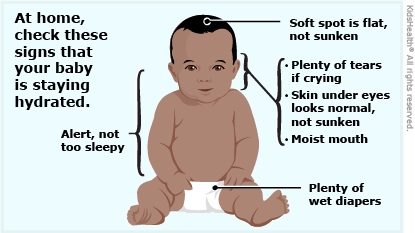Dehydration happens when there is not enough water in the body. In babies, it is often caused by vomiting, diarrhea, or both. It also can happen when babies don't want to drink because they have mouth sores or a sore throat.
Give breast milk, formula, or an oral electrolyte solution (such as Pedialyte®, Enfalyte®, or a store brand) as recommended by your health care provider to help your baby recover from dehydration. You can buy the oral electrolyte solution at drugstores or supermarkets without a prescription.
Here's how to take care of your baby.

Feeding your baby:
- Continue feeding your baby as usual unless your health care provider tells you otherwise. Your baby may want to feed more often, and that's OK.
- If your baby doesn't want a full feeding, try breastfeeding or giving formula more often but for shorter amounts of time (5–10 minutes every 1–2 hours). You can also give formula or pumped breastmilk with an oral syringe, a medicine cup, or a kitchen teaspoon. You can slowly go back to your usual feeding schedule as long as your baby isn't vomiting.
- Your health care provider may want you to give your baby an oral electrolyte solution in addition to their regular feeding. Use a bottle, small cup, spoon, or syringe to give as directed by your health care provider.
- If your baby is eating solid foods, continue to offer their regular foods. As long as your baby is drinking, it's OK if they don't want solid foods at first.
If your baby is vomiting again and again, don't give them breastmilk, formula, or solid foods and give an oral electrolyte solution instead:
- Start giving the oral electrolyte solution right away. Even if your baby just vomited, you should still start the oral electrolyte solution.
- Give your baby 5–10 ml (1–2 teaspoons) of the oral electrolyte solution every few minutes. You can use an oral syringe, a medicine cup, or a kitchen spoon.
- After 1 hour, if your baby is not vomiting, increase the amount a little bit and give 15–20 ml (3–4 teaspoons).
- Continue to give this amount every few minutes for the next hour or two.
- If your child vomits again, go back to #1 and start this process over.
- Call your health care provider about what to do next. Your baby may need to be checked again to make sure they are OK.
Other important information:
- You will know your baby is getting enough liquids if:
- They have a wet diaper every 4–6 hours.
- Their mouth is moist.
- They have tears when they cry.
- Give any medicines as prescribed by your health care provider.
- Don't give any medicines for vomiting or diarrhea without checking with your health care provider.
- If your baby has a fever, check with your health care provider if it's OK to give acetaminophen (such as Tylenol® or a store brand) or ibuprofen (such as Advil®, Motrin®, or a store brand).
- Don't give your baby aspirin. It can cause Reye syndrome, a rare but serious illness.
- Follow the health care provider's recommendations for any diet changes.
- Do NOT give your baby:
- Plain water, sports drinks, soda, or full-strength (undiluted) juice
- Medicines for nausea, diarrhea, or vomiting, unless told to by your health care provider
- Diluted (watered-down) formula
- Do not give oral electrolyte solution as your baby's only liquids for more than 24 hours.
- Keep your baby out of childcare until they have no vomiting, diarrhea, or fever for at least 24 hours.

Your baby:
- Isn't drinking at all or has signs of dehydration, such as a dry or sticky mouth, sunken eyes or a sunken soft spot on the head, more than 4–6 hours without a wet diaper, darker than usual pee, crying with little or no tears, or decreased alertness
- Is 3 months or younger and has a rectal (taken in the bottom) temperature of 100.4°F (38°C) or higher
- Has vomit that's bright green, red, or brown, or has forceful vomiting
- Is crying a lot and can't be calmed down
- Seems to have belly pain or other pain
You know your baby best. If your baby seems very sick or has symptoms that worry you, call your health care provider or take your baby to the ER.

How do oral electrolyte solutions help keep a baby hydrated? These solutions contain a balanced mix of water, electrolytes (sodium, chloride, and potassium), and sugars (glucose). They give the baby the fluids they need and replace the liquids and electrolytes that are lost through diarrhea or vomiting. This helps prevent or treat dehydration and keep the body's electrolytes balanced.
Is dehydration dangerous? Mild dehydration in healthy babies usually isn't dangerous. But dehydration that gets more severe can cause the body to shut down and can even become life-threatening.




